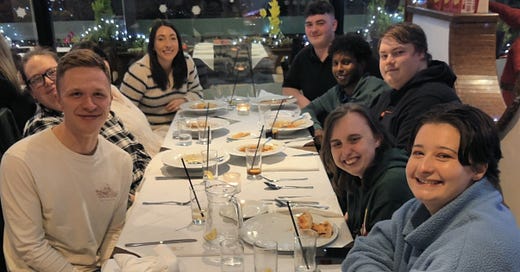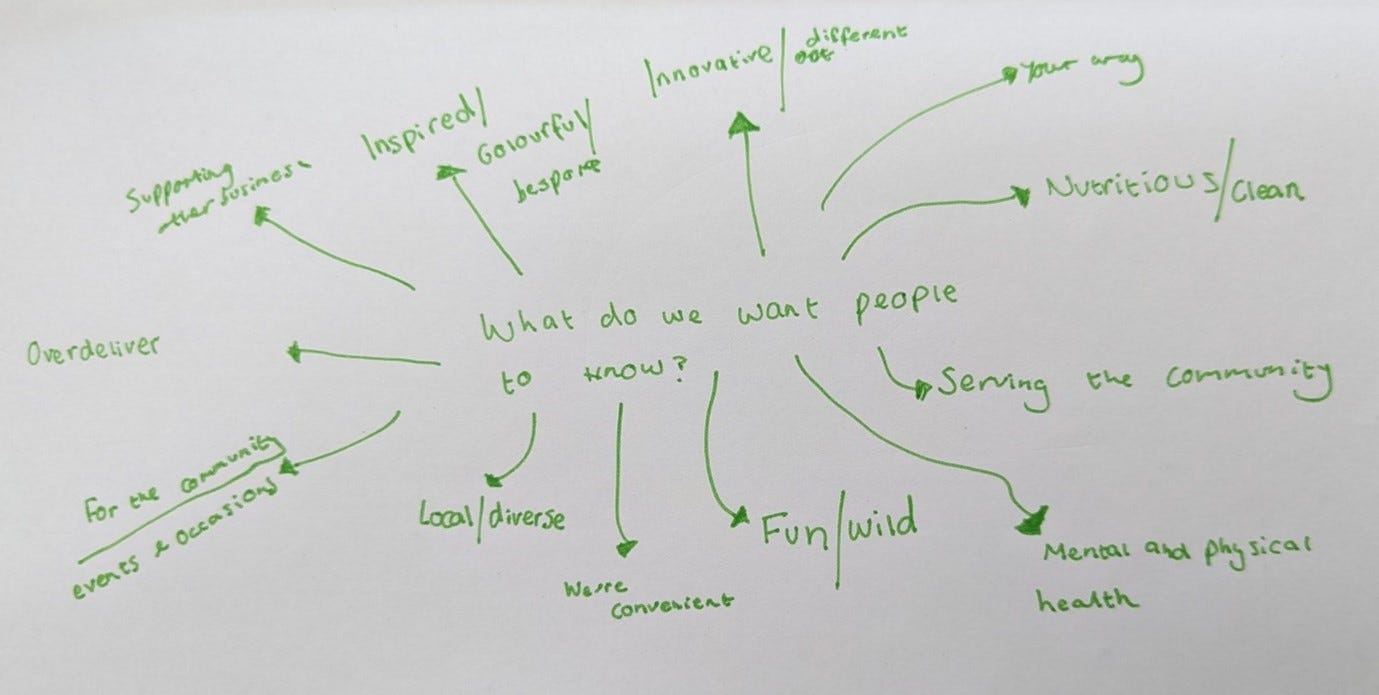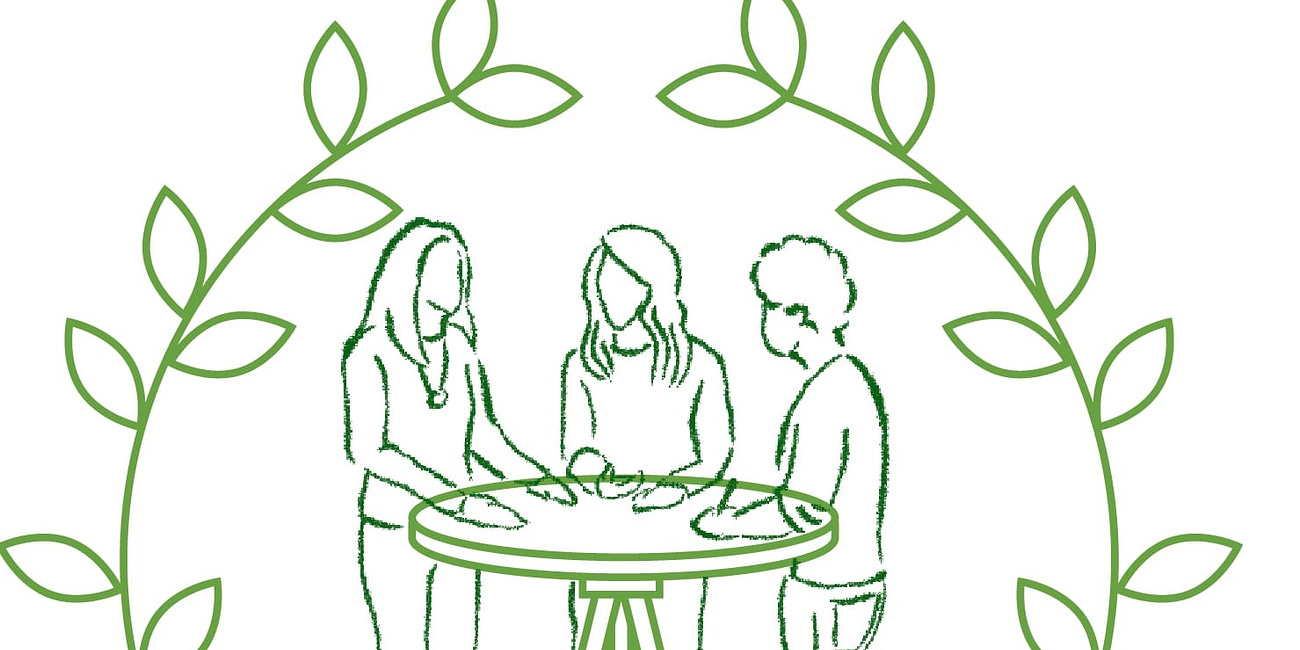Economics with People
Volume 3: Chapter 8: Local people co-producing solutions to building community wealth
This chapter is co-authored by Lewis Nelson, Economies for Healthier Lives Co-production Facilitator, with Jasmine Graham and Josh Baxter, two local people involved in the co-production work and in the process of setting up social enterprises.
How are local people starting to create new social businesses that can enter the supply chains of local anchor institutions?
Lewis Nelson (Co-production Facilitator):
In Salford, we are trailblazers of a new approach to shifting spending to local supply chains that are not only new, but are wholly and collectively owned by local people. The process did not come from a previously tried ‘how to’ guide and, as a facilitator, I have had to build a new programme from the ground up, responsive to the strengths of the local people participating and of local anchor institutions. From the very first session, I recognised that these social businesses will be successful due to the bonds and trust that participants have with each other, so that they can have fun, and learn about each other and how best to work well together.
Emerging through the process, three distinct preparatory phases emerged:
· Phase 1: Exploring the alternative economic model.
The whole approach is about locality. To support learning, our sessions put the local area’s reality into the spotlight - its economic decline. We explored how multinational companies treat workers locally, where profit
goes, how the community’s health and well-being are impacted and the impact on the environment. We discussed how these social businesses could be better, if they adopted alternative models, and the group chose for themselves that businesses that are owned locally where the staff and/or community have control are best placed to meet local needs.
· Phase 2: Exploring the market opportunities.
As local anchor institutions shared each market opportunity with us (such as food, child care, and grounds maintenance), participants delved into each one, testing whether the opportunity was viable. They considered: Is there demand? Who might our customers be from amongst the local anchor institutions? How much might they pay us? Would it make a profit? Do we have the resources? Can we access them? We concluded the assessment with the questions: do we think the opportunity could be viable?; and does the group want to explore it further? Each session included a knowledge or skills building activity, supporting the development needs of the group working on things like time management, coping strategies for stress and confidence.
· Phase 3: Learning the principles of business and testing the viability of market opportunities.
The local people involved needed to be equipped with a strong foundational knowledge of how businesses work, what the vocabulary used in business means and how it would relate to the emerging social businesses – we explored these principles in each session. We also delved into some other foundational skills, such as how to present, what professional behaviour is and how to resolve conflict. For some participants, the emerging social businesses will be their first ever job. For those opportunities that appeared viable with sufficient interest, we took a strengths-based approach identifying what skills we have to bring to them, and what skills we need to seek out.
If you would like example resources, we are more than happy to share. Please get in touch. Listen to some of Lewis’ reflections on the first three phases here:
Where are we now? By Jasmin and Josh
Jasmin Graham and Josh Baxter, local people involved in the co-production work and in the process of setting up social businesses
Our journey so far in this experience has been very different to what we could have first envisaged, and it has been a learning experience. We weren’t naïve about how long it would take to set up a business, but the two years leading to now has been longer than we expected. We thought we would have operational businesses by now. The reality of working with the local anchor institutions has meant that it has not been the same as conventional business set-up. The process has been thorough and there
have been times where we have just been waiting for information. In the meantime, with time, our lives have changed and our own priorities have changed from when we first met. We cannot imagine that setting up a ‘conventional’ business would require so much time and personal investment before a day of ‘doing the job’, but we know that the vision of this project will make Salford a better place and give us and people like us a decent opportunity to make lives better.
Image: The group celebrating at the end of year 2 of our journey. (Lewis and Jasmin on the left, Josh on the right)
We have developed as people, and have become more sure of ourselves. Jasmin has always had an entrepreneurial interest that this project has spoken to and has this year started studies at Manchester Metropolitan University studying International Business. Economies for Healthier Lives has supported Jasmin to develop her confidence to do this. Josh is now in his final year of his apprenticeship on his way to becoming a qualified engineer. Economies for Healthier Lives has helped to demonstrate that it is possible to work towards a positive end goal. Josh hopes to bring his skills into business. Others who have been on this journey with us, decided that the businesses we’re building are not for them, and others have made huge moves and decisions in their personal lives too – but remain dedicated to what we have been working to achieve together.
With 18 months of learning and preparations behind us, it still feels like a huge leap to creating the social businesses we have been working towards for so long. But that leap is now a reality and our feet are off the ground.
Developing our case
We have been working on the practical elements recently, thinking about: What is our mission statement? What makes us different from the competition? What makes us better?
We know that we need to get the basics right and offer a great dependable service. Salford is a place that we know better than the competition. We live and breathe the services we want to offer: we are customers, clients, neighbours, patients and stakeholders of the local anchor institutions we want to do business with. That means more than knowing them and their values, it means we know how we can (as social businesses) best reinvest profits back into the community and offer a service that doesn’t only meet contractual requirements, but also meets the needs of Salford and its people.
If you read the previous chapter, you will know we are developing the businesses in partnership with opportunities available with local anchor institutions. Both local anchor institutions and the emerging social businesses have stepped out of our comfort zones to get to this point. Recently, meetings have been held with three of the local anchor institutions. We have gone through contracts and service requirements. This was an intimidating but positive experience.
Our businesses and the local anchor institutions feel aligned in values and are working together to ensure that success is possible with us becoming a trusted supplier and ensuring the best possible service delivery. Some examples of what we are doing to achieve this include: adapting payment terms and timescales to suit smaller businesses better; gradually increasing the size of contract available and amount of services purchased; and solid communication built into how we work together.
Tailoring this process to us individually was really important and invaluable to fostering trust, good working relationships and confidence in what we are trying to achieve. We recommend thinking about what adaptions you can make to assist smaller social businesses to enter supply chains and thrive in business.
As new information is collated, our business plans have been progressing. The nuts and bolts of the future balance sheet and the qualifications we need to secure are now becoming predictable and a reality. We have used the EPOCH business plan model (excellence, people, outcomes, customers, how much) to base our business around and have been working out our mission statements.
Image: A spider diagram to help define our mission statement (food and catering).
Recently, we have been doing market research for each opportunity to enable us to properly understand the market opportunities. For each opportunity, we are building a business proposal, these proposals will give us a base to assess which opportunities we are able to deliver on. Once we know which are most attractive to us, we will put forward our case to the local anchor institutions. That being said, we need to be realistic in what opportunities we can take up in our first year of trading, and at the moment for both the social business working groups, there are some opportunities that feel realistic and others that feel too big for us to take on in our infancy. We are working this out one by one and, given that we can consult with the local anchor institutions themselves, it shows the value of co-production.
Image: Doing market research at the University of Salford to understand what food offer students and staff want.
Assessing our strengths and what barriers exist
The process of working things out means we have needed to look at our strengths. We have some knowledge, skills and experience in relevant fields to the businesses we are creating. But we realise that our community is diverse and we need to better understand what food options, for example, would universally appeal. Similarly, the practical needs of our businesses have highlighted barriers that we need to assess whether we can overcome. As is typical for our ages in the place we live, few of us drive and transporting goods by bus is just not a practical option. Some of us have never been in paid employment before, and whilst we can discuss what our jobs may look like and what the needs of the business will be, we cannot be totally confident of ourselves and each other from day one. We might need to recruit business-specific skills, experience and capabilities to put together a viable business. Where that isn’t an option, we are upskilling ourselves and retraining. All of this takes time and money, so our advice for others would be to explore all available resources as early as possible.
For those of us already in paid employment, the leap feels just as big for those of us who aren’t. We have practical worries: How will I be sure that I can pay all of my outgoings? What if it doesn’t work out? What if this is all a mistake? For those of us who are not in work, the worries are similar due to leaving the safety net of Universal Credit. This might be caused by imposter syndrome, or fears that this isn’t the right thing to do for our careers. We know anxiety is a natural part of change in this process but it is important to articulate that we’re feeling it, as it is important to share. We don’t have the answers on how to avoiding feeling anxious, but we can say we are proud of ourselves for taking on this challenge and pursuing our dreams of changing things for the better.
We have seen our confidence and the confidence of our team grow. It will probably feel like a big leap until we are actually doing the work. If you are following along in our journey and want to hear more about the process we are working through, and how this is going, please get in touch. We hope that what we learn can help and inspire others to do similar.
Next time:
What does co-production between local people and local anchor institutions look like in practice?
Next chapter here:
Economics with People
What does co-production between local people and local anchor institutions look like in practice?







